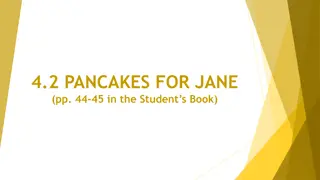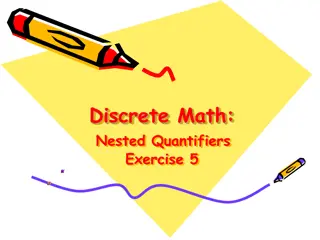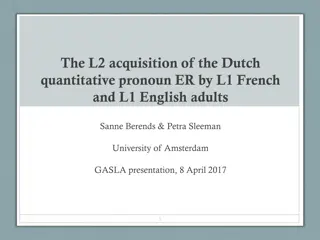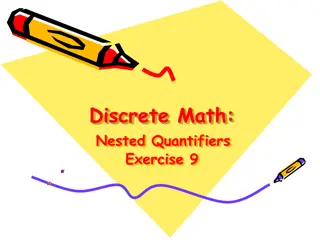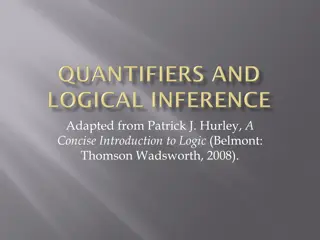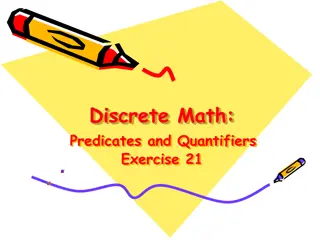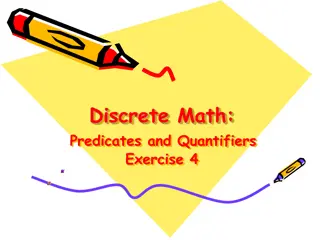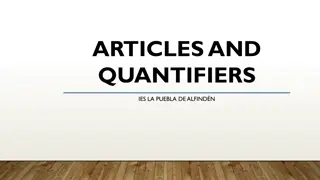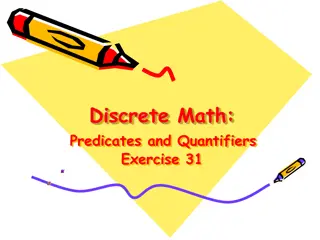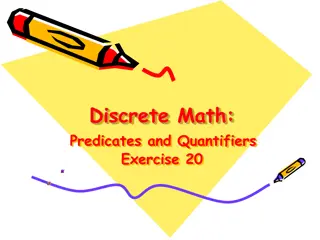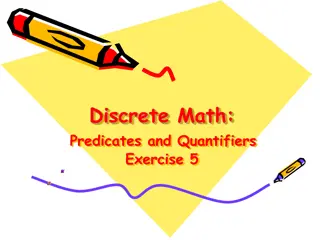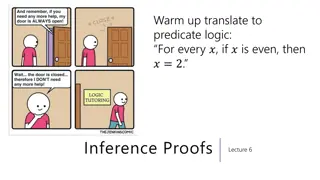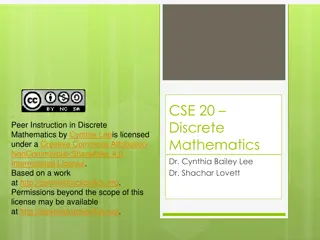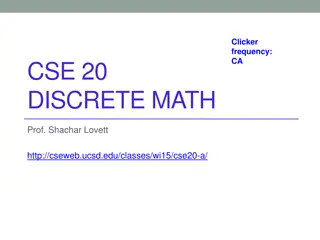
Understanding Quantifiers for Countable and Uncountable Nouns
Learn about quantifiers for countable and uncountable nouns, including examples of how to use words like "all," "many," "few," "little," "both," and more. Understand when to use quantifiers with prepositions and how they relate to specific and general groups.
Download Presentation

Please find below an Image/Link to download the presentation.
The content on the website is provided AS IS for your information and personal use only. It may not be sold, licensed, or shared on other websites without obtaining consent from the author. If you encounter any issues during the download, it is possible that the publisher has removed the file from their server.
You are allowed to download the files provided on this website for personal or commercial use, subject to the condition that they are used lawfully. All files are the property of their respective owners.
The content on the website is provided AS IS for your information and personal use only. It may not be sold, licensed, or shared on other websites without obtaining consent from the author.
E N D
Presentation Transcript
QUANTIFIERS MARKOVIC ANA RASTODER ELIDA RADUSINOVIC SANJA
Quantifiers Countable nouns Countable nouns Every, each, all each/every Each/every book cost $10. all All the books were quite cheap. All the furniture were quite cheap. Most most Most books were quite expensive. Most of the furniture were quite cheap. Many, much, a great deal of, a lot of, lots of, loads of, plenty of many Have you got many books? I haven t got many books. a lot of, lots of, loads of, plenty of I ve got a lot of/lots of/loads of/plenty of books. Much/a great deal of Have you got much/a great deal of furniture? I haven t got much/a great deal of furniture. a lot of, lots of, loads of, plenty of I ve got a lot of/lots of/loads of/plenty of furniture whole whole I ve read the whole book. A number of, several, a few, a couple of, a little, some a number of, several, a few, a couple of I ve got a number of/ several/ a few/ a couple of books. some I ve got some books. a little I ve got a little furniture. I ve got some furniture.
quantifiers Countable nouns Uncountable nouns Few, little few I ve got few books. little I ve got little furniture. Both both Both these books are mine. Neither neither Neither book was expensive. Either either You can buy either book. No, none of no I ve got no books. none of None of the books belongs to me. I ve got no furniture. None of the furniture belongs to me.
NOTE: A FEW and A LITTLE have a similar meaning to some. *We are staying in London for a few days. BUT FEW and LITTLE mean not as many or as much as we d like *Unfortunately, there is little hope of success. The following quantifiers are always used with the preposition OF: *a number of, a couple of, a great deal of, a lot of, lots of, loads of, plenty of, none of These quantifiers are used particularly with abstract nouns such as time, money and trouble: *a great deal of a good deal of *It will probably cost a great deal of money. *He spent a good deal of time watching television.
NOTE: All other quantifiers (except no and every)can be used with the preposition OF, if it is followed by a personal pronoun, a pronoun (possessive or demonstrative)+noun/definite article the *Most shops/most of the shops were open. *John spent most of his life on the farm. Few snakes are dangerous. Most children like chocolate. I never have enough money. *A few of us took a taxi home. Members of groups *We put a noun directly after a quantifier when we are talking about members of a group in general: Few of the snakes in this zoo are dangerous. Most of the boys at my school play football. Both (of) the chairs in my office are broken. *but if we are talking about members of a specific group, we use of the as well: Note: with ALL and BOTH, we don t need to use OF. We can say ALL THE and BOTH THE
NOTE: BOTH, EITHER AND NEITHER *If we are talking about two people or things, we use the quantifiers both, either and neither: *Note that nouns with BOTH have a plural verb, but nouns with EITHER and NEITHER have a singular verb. -Both the supermarkets were closed. -Neither of the supermarkets was open. -I don t think either of the supermarkets was open. We use the quantifiers EVERY and EACH with singular nouns to mean ALL: *There was a party in every street. (= There were parties in all the streets.) *Every shop was decorated with flowers. (= All the shops were decorated with flowers.) *Each child was given a prize. (= All the children were given a prize.) *There was a prize in each competition. (= There were prizes in all the competitions.)
EXERCISES: Choose the correct options. Sometimes more than one option is correct. 1Every / All / Each of the people who want to go into space will have to undergo some medical tests. 2 As much / a lot of / many as 1,000 actors will be needed to make the film in our city. 3 I need some advice on how to sell loads / a great deal / plenty of e-books on Amazon. 4 I m sure that several / lots / a number of students in my class are going to the concert. 5 No / None of / Neither of the people I know enjoy doing housework. 6 What does this word mean? No / Neither of /None of my two dictionaries explains it. 7 Loads / Lot / A great deal of volunteers are still needed for the summer festival. 8 A number of / Several / A great deal of people have called Ann and congratulated her on her marriage. 9 I m really proud of each of / all / every the students who graduated this year. 10 We can t pay you much / many / lot more than seven pounds an hour for your work. Quizes links: https://www.english-grammar.at/online_exercises/quantifiers/qf014-quanitifiers.htm https://test-english.com/grammar-points/b1-b2/quantifiers/




